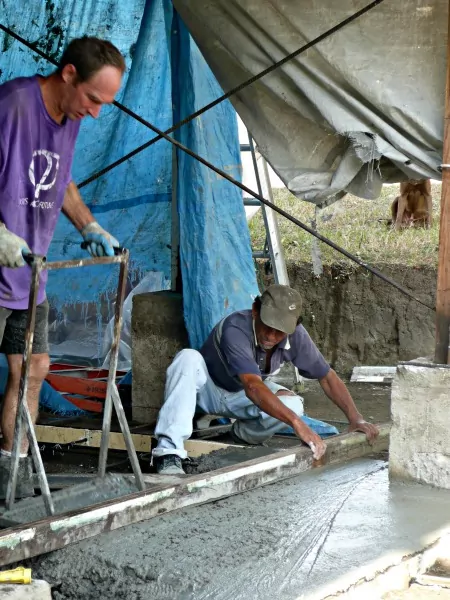
I wrote a post about each of these 4 building materials. The links to those posts are at the bottom of this page.
Whatever construction materials you use for your house, you need think about your choice carefully.
Hopefully, the answer is yes to all of the above questions. If not, make sure you are okay with the extra work and/or cost using your chosen material will entail.
One thing you should be careful about, is using building materials or construction techniques with which the local labor is unfamiliar.
If you get too innovative, you are likely to lose the locals along the way. Certainly, they will not be as interested in trying a new building experiment as you, the northern immigrant. You are in for a shock, if you came to Panama with ego-driven notions of how you would build, once you had moved to paradise, and with labor day rates that are less than half of what hourly rates are up north.
For some of us (I include myself here), this will require that we put our own ego in the “back seat." If you don't, you will face a lot of frustration, cost overruns, and disappointing results.
For me, after a long period of trying get the local builders to do things exactly, precisely my way, I have come to the conclusion that it is just not worth it. Believe me, I have tried it, many times (I am a slow learner). It just does not work. Or if it works, it is not a happy experience for anyone.
There are many wonderful things about the Panamanian people. When taken on their own merits, the people of Panama are kind, peaceful, genuinely warm neighbors, and happy to share their beautiful country with us. However, an intrinsic desire to learn something new, from foreigners no less, is not high on their priority list.
It is my opinion that we expats do best when we accept that fact. When we don’t try to impose our own perfectionism and rigid views upon the locals. Our own culture has certainly made plenty of mistakes, and continues to make mistakes and on a global scale.
Maybe we are being offered this opportunity to compromise a bit, to be less perfectionistic and judgmental . With this attitude well in mind, you can produce an interesting, good quality, project. A project that you can be proud of. And most importantly, you will build your house in a way that will not make enemies of your new Panamanian friends. Those relationships will be a joy for years to come.
July 16, 2016

UPDATE: Del Monte now has full legislative approval to grow bananas in Puerto Armuelles & Baru.
A big crowd had gathered in ESPA's high school gymnasium to hear the news. The Panamanian Minister of the Presidency, Alvaro Aleman, and other officials signed documents.
There was a very long speech by the mayor of Puerto Armuelles, Franklin Valdez, followed by a not-quite-as-long speech by Alvaro Aleman. Nothing surprising was said. Alot of talk of jobs, economic recovery, and how hard they are working to get an agreement with Del Monte to revive the banana industry in the Baru district of the Chiriqui province.
Alvaro Aleman told the crowd that the first step towards reviving the banana industry in Baru was to sign an agreement with Del Monte. However, that agreement must be approved by the Council of Ministers and then ratified by the Panama National Assembly.
"I am confident that this bill, which will be presented in this legislative period, will be passed so that next summer Del Monte can begin its investments in the area," said Aleman.
The minister said that if approved, Del Monte could make up to $220 million in investments in the Baru plantations which will provide, "important sources of work."
He also explained that one of the outstanding issues is how and whether to allow Del Monte to buy the plantations since some of them are within 10 kilometers of the border. The Panama Constitution prohibits foreigners from owning land within 10 kilometers of the border.
Del Monte is interested in acquiring "approximately 2,572 hectares belonging to the State, 840 hectares owed by an agricultural association, and 1,771 hectares that are privately owned." said Aleman.
Varela visits in September & updates Del Monte progress
The atmosphere of the crowd was one of muted and wary optimism. While much was made of the signing of documents, it was only another step in the long process of getting a banana company in Puerto Armuelles. The current talks with Del Monte have been going on for more than a year so far.
Progress has been made. Del Monte has asked to be allowed to hire foreign labor, but it was agreed that they would follow Panama labor laws, which makes bringing in foreign labor very difficult.
There is another company that wants to take over banana production in the plantations in the District of Baru. About a year ago, Coobana, a worker's cooperative also expressed interest in taking over the banana plantations in the Puerto Armuelles area. That proposal was not mentioned during yesterday's meeting.
2 banana worker cooperatives started in the wake of Chiquita pulling out (in Puerto Armulles) and greatly scaling back (in Bocas del Toro). Puerto Armuelles's worker cooperative, Coosemupar, was a dismal failure for many reasons.
On the other hand, Bocas's cooperative, Coobana, continues to be a success. Their success is credited to the critical and successful overture Coobana made to supply bananas to Europe. Coobana has had to modify many of its labor and growing practices to comply with European standards.
Given that the Minister of President of Panama was here to announce further progress in negotiations with Del Monte, Coobana coming to Puerto seems unlikely. However, I think a company run by other Panamanian banana workers would be a good choice for Puerto. Especially a company that has improved both labor practices and safe growing methods.
I am not sure of all the details of the proposal of either Del Monte or Coobana though. I have heard some say that Coobana has already taken over some of the plantations in Baru. Perhaps those are the lands mentioned above that are owned by an "agricultural association". Accurate information can be hard to get in Panama.
For now we will have to wait and see what develops. I know that the owners of Puerto's newest restaurant, Cafe del Mar, are looking forward to a new banana company and the influx of money into the pockets of Portenos.
Enjoy the photo gallery of yesterday's Del Monte meeting. Click on any photo to start the slideshow.
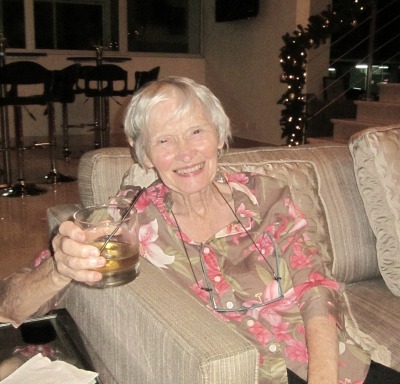
He left Puerto Armuelles to spend what he thinks are his final years living with a close friend in Costa Rica. This woman is half his age, very kind, and she has the resources to provide for all of his needs.
This situation, and the fact that Betsy and I have 2 elderly parents currently in assisted living in the U.S., has prompted me to do a bit of thinking and researching on the subject of aging.
This article is aimed at readers who are thinking about retiring in Panama.
I hope you find it useful. Please send in comments, since we hope to continue writing about this very important topic.
On those very rare times when Betsy and I actually talk about "when we get truly old" or aging (other than to complain about aching shoulders, hips, fingers, you name it), it seems that Betsy is inclined to want to be in Seattle, or living with or near one of our daughters, wherever that may be, when she gets to be truly old.
I, on the other hand, though I will miss my friends and family from the north, imagine that a life in a warmer climate, would be optimal, at least most of the year. Fortunately, in our case, I am probably willing to acquiesce to Betsy’s preferences. Her wisdom in such matters is generally correct. Our family always benefits when we follow Betsy’s intuitions. (Of course, she could also change her mind.)
Having admitted all this, I still think that there is a good place in our retirement plans for Panama, particularly in our early retirement.
But why would a person choose to arrive at his/her final years, and final days in a foreign country, far from family? What are the potential advantages/disadvantages? Is this a valid option for retirees to consider?
There is lots of hype on the internet about the advantages of retiring overseas, in the tropics, even in Panama itself. But what would it be like for you? (What would it be like for me? I’m 56. Betsy is 54.)
Warmer
First of all, we both agree that we feel younger in the warmth of Panama than we do in the cold and damp of Seattle (That is, except during the peak of the dry season in Panama, which is too hot for us. And during summer in Seattle, which is the most ideal weather on Earth, we think.)
Affordable Home Health Aides
If it were merely about the money, then yes, Panama is much cheaper than the U.S. (I do not know enough to make a verdict about Canada).
I just wrote another article about healthcare in Panama. In it, I mentioned that one of the biggest differences in the cost for healthcare in the U.S. vs. Panama is the vast difference in labor costs for basic, unskilled, or semi-skilled nursing care.
A large factor in health care costs for the elderly is the need for more and more hours of home health care and nursing care. The elderly expat living in Panama will have huge saving potential on such aid,
In Puerto Armuelles, it is possible to find a live-in domestic helper for as little as $400/month. In David, this cost would be somewhat higher. In Panama City, you might pay as much as $2000/month for a fully licensed professional nurse through an agency.
With careful research, checking references, you can find an excellent helper. Some expats have reported that their own domestic aid has become more like a part of their family than a hired helper. Some expats even include this person in their will as a beneficiary.
Conversely, with poor planning, or just bad luck, you might end up hiring someone who is a terrible worker, or even steals from you. (Unfortunately, this last detail can occur anywhere. I remember my well-to-do grandmother, who was blind and lived to be 97, was routinely robbed at her expensive retirement home in Washington D.C. So, you can have a bad experience of this sort anywhere).
Betsy’s mom is in a great retirement home in Seattle, about 2 miles from our Seattle home. My father is in a retirement home in Washington D.C., close to my sister’s home. Both of our parents rely upon and cherish visits from their adult children and their grandchildren.
Panama not good choice for Betsy's Mom
In the case of Betsy’s mom, she would not fare well in Panama. She has a lot of trouble “focusing” and, though she is a wonderful woman, she has trouble making real friends, because she has trouble following conversations with other adults. It is only with loving one-on-one chats with her children (including me) that she feels that emotional bond that she so craves.
Panama would have been a good choice for My Dad
In the case of my father, he has spent much of his adult life living abroad. And much of that time in the tropics (my sisters were born in Cuba). He would be very comfortable with the idea of retirement in Panama. He even speaks pretty good Spanish.
Other than my older sister, he does not see many family members on a regular basis. However, he is quite content to go to the dining hall or social hall, and strike up a conversation with just about anyone.
In truth, he says that he would have loved to retire in the tropics. In his wistful moments, he sometimes asks himself why he didn’t stay in the tropics to retire. However, at 90 years of age, it seems too late for him to make the move down to Panama. He is in a safe, happy environment and most days he seems to do pretty well. It is only on his bad days that he wishes he were somewhere else --- A lot like everyone.
Since I am now “pushing” 60 myself, I think I can relate with many of the expats who are considering a move down to Panama for their retirement.
Retirement Business
A lot of the folks who are closer to my age, on the younger side of retirement, would like to semi-retire early, and continue to do some sort of work in Panama.
That is what we have done, by investing and land developing in Puerto Armuelles. We effectively bought a small retirement business. This works well for both of us, since we have never viewed retirement as those years after 65 when one has earned the right to do absolutely nothing. We plan to stay active always, or at least as long as we possibly can.
Is Your Plan To "Go Back Home"?
Some retirees who choose to move to Panama at 55, 60, 65, or 70 may have in mind to return "back home" to be close to family and loved ones, when they finally arrive at their advanced old age. This desire is quite common. There seems to be something in each one of us that longs for the familiar, as our world grows smaller and smaller, and we prepare for our own death.
Plan Ahead to Age in Panama
There is a growing number of single retirees in the U.S., who either never married, or are divorced, or whose spouse has died. Some of these retirees may not have anyone in the U.S. to return to in their last years.
For such folks, it is probably advisable to come to Panama early enough in their retirement, so that they can become familiar with their new home, make friends, and prepare a late retirement environment that suits them. They will probably want to have a close friend or family member, at the very least, to supervise their caregivers and pay their bills, when they are no longer able to so. Even in the States, an elderly person needs someone to be their advocate, to make sure that they are well cared for, and listened to (this is a big one).
Letting Go
No matter what form your late old age takes, or where that event takes place, there is a tremendous amount of “letting go” that one must do in order to make the transition from healthy retirement, to a state of being very old, chronically weak, or sick, and eventually dying.
I know that my own father is still resentful that the keys to his car were finally taken away a couple of years ago. Betsy’s mom has had similar problems letting go of her independence, especially letting go of her car.
There are those who think that having the North American elderly loose on the roadways of Panama would not hurt the general quality of driving here in Panama…that is a subjective opinion.
I am not trying to come to any conclusions here. The idea is to inspire thinking and a dialogue about what each of us envisions as our own best scenario for our final years.
Clearly, one can live more comfortably in Panama, on less money. This, in itself, might be the answer, if you are not able to afford to retire, or be old or sick, in the U.S. (or wherever your "home" is.) However, for those who have options, the conclusion might be different.
Maybe Panama is the right choice for one’s early retirement years, as a new adventure, or chapter of your life. Maybe Panama allows you to enjoy your retirement, as well as allow you to bank all the saving that Panama offers. Because when, and if, you move back to the U.S. (or other place) to be closer to family, your living and health costs will be much high.
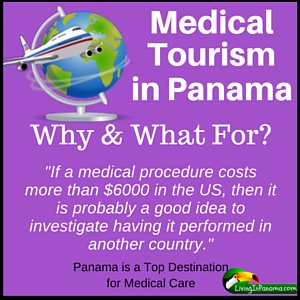
Health care information on our site:
2 hospital visits in Puerto Armuelles
4 tips for a healthy lifestyle in Panama
Overview of Health Care & Insurance Options in Panama
This friend, let's call him Bill, needs treatment for a life threatening condition. He has heavy metal poisoning due to exposure over the course of his career.
Tragically, the procedure that he requires is not yet approved in the US. The closest procedure available in the US would cost him between $20,000 to $30,000.
And his insurance doesn't cover it.
So Bill wants to get treatment outside of the USA.
Currently, Bill is trying to decide between Puerto Vallarta, Mexico, and Panama for a, hopefully, life saving procedure. As you can imagine, Bill is extremely interested in comparing service, cost, and care in Panama with that in Mexico.
Bill's plight prompted me to do some more research into health care in Panama. I am sharing my findings with you.
Not surprisingly, like many other places, the healthcare business is growing rapidly in Panama.
As we all read every day, and experience personally, we U.S. baby boomers are finally arriving at retirement age. As you would expect, the growth of the health care business is keeping pace and focusing more on health problems that happen as we age.
Lower Cost of Health Care in Panama
For most healthcare procedures, Panama is far less expensive than Mexico, or even neighboring Costa Rica.
In part, this is due to a lower wage scale for nurse care and lower cost for hospital stays.
If Bill were to get the same procedure done in Mexico (the one that costs $20-$30K in the US), it would likely to cost between $4,000 to $6000. At first glance, it appears that the same procedure, performed in Panama would be less than half of the cost in Mexico.
One healthcare publication states that,
‘If a medical procedure costs more than $6000 in the US, then it is probably a good idea to investigate having it performed in another country.’
Panama ranks high on the list of destinations for medical toursim.
In Panama, the health care services that consistently rate highest on the list for quality, and cost savings, among expats surveyed were:
Not surprisingly, these are all services that are not usually covered by health insurance in the US. Obviously, for the uninsured, the list of procedures that are advantageous to have done in Panama is much longer.
However, increasing number people traveling to Panama for major surgeries, orthopedic surgeries, joint replacements, and even transplants are helping to put Panama near the top of the list for overseas medical destinations.
(The common term these days for traveling to have health procedures done is “Medical Tourism”).
Superior Doctor/Patient Relationship in Panama
Aside from cost savings in Panama, many patients cited dramatically superior doctor/patient relations in Panama as why they choose to get health care here.
Frequently in the US patients are attended primarily by nurses or doctors’ assistants, who handle all of the paperwork, blood work, routine measurements, injections, etc. The doctor himself/herself comes in for a brief examination that is sometimes as short as 60 seconds and rarely as long as 10 minutes.
In Panama, one frequently hears fellow ex-pats exclaim that their Panamanian doctor is the best they have ever had. They marvel that he or she spends between 30 minutes to 1 hour, one-on- one, getting to know them, and becoming familiar with their specific symptoms.
Amazingly, Doctors in Panama generally give their personal cell phone number to patients. They even take calls from patients at home, including weekends and evenings. In this area of personalized patient care, Panama has the US beat hands down.
On the negative side, areas of patient care in Panama that are most frequently criticized are:
However, most western expats/foreigners can afford care at a private hospital emergency room, where service is much faster.
Seattle vs Panama as Health Care Destination
As a gross comparison, Seattle, where we live part of the year, is another very popular location for both international and domestic medical tourism.
Like Boston, and some other big cities, Seattle has become a powerhouse in the world of bio-tech and cancer research as well as clinical treatment. As such, it is not uncommon to run into people, who are in Seattle to be treated at prestigious cancer care centers as: Seattle Cancer Care Alliance, Fred Hutchinson Cancer Clinic, The University of Washington Hospital, or others.
Simply the cost of renting in Seattle, a super- expensive rental market, in addition to the housing costs back home, is a significant cost. Add to that the high medical costs of undergoing a bone marrow/ stem cell transplant, radiation, or chemo therapy, and then recovery and the bill could easily run into the 100s of thousands of dollars.
Obviously, such medical tourism is something that only the very privileged or those with amazing insurance can afford.
If you are faced with the reality of one’s own very serious and costly health condition, Panama looks like a viable alternative to care in the US.
We advise that you take your time, do thorough research of costs, services provided, and most importantly, do a “gut check” of your own comfort zone, to see if Panama might be a good fit for your health care needs.
[leadplayer_vid id="5748DEB117A7C"]
Betsy of Living In Panama (off camera) asked:
Veronica, why did you decide to move to Panama and why Puerto Armuelles?
Veronica Answers Below
Well, I had a farm in Costa Rica for many, many, many years and I really liked Costa Rica, but
things changed.
And I started looking around.
So for 4 or 5 years I looked.
I came to Panama, in the beginning, to go to Boquete to a school, a language school there, Habla Ya, to make my Spanish much better.
So what we did was: 1st we made a list.
What things are important to us.
So we made our list.
Drew a couple of circles on maps.
I had been to Boquete for a few months. I stayed there while I went to school.
I like Boquete. However, for me it's too cold and I don't like the raininess.
To me that's .. And it wasn't near enough to the ocean.
And we started looking around for another place.
And I happened to see Puerto Armuelles on the map.
People didn't have a lot of things to say about it, buy you never know until you
go look. So we drove down.
One trip we came down here we were going to spend 3 months driving around, getting to
see all the places up close and personal. We liked some other areas as well.
We got as far as Puerto Armuelles and stayed at the Tsunami Inn.
And we stayed and we stayed and we stayed.
We met nice people, looked at land and it fit all the criteria.
So this is home.
Now we have a farm, Finca Bella Vista, in the hills just above Puerto Armuelles.
2 kilometers out, I think, totally.
We just love it.
We are building a house and a barn, a stable. I do dressage, it's dancing with your horse, so to speak. And I also am a wildlife rehaber. I specialize in birds and small mammals.
And Puerto is nice. It really is very peaceful.
We decided to retire here and this is our home now.
I love it.
There's a lot to do. I ride the horses on the beach. There's all kinds of sports. We are heavily involved in calf roping.
It's fun. I love it here.
I absolutely love it.
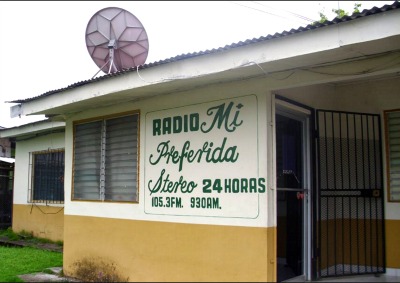
UPDATE - The radio show is currently paused (June 2016)
Recent transplants to Puerto Armuelles, Michael Butler and Beverley McAleese, have undertaken a new adventure. They will be hosting a weekly program at our local radio station “Radio Mi Preferida” (located behind Romero’s).
It is fun that our town is small enough, and simple enough, that you can still make a proposal for a radio program, do the necessary research for the show, find a way to cover costs (I am sure contributions will be welcome. Betsy and I have already pledged to contribute), and get the program on the air.
What is amazing is that in our little town of Puerto Armuelles, one of the co-anchors of the new radio show, Michael Butler, has 45 years of broadcast journalism experience in the private sector and with the CBC in Toronto, Ontario.
Michael’s roles in radio have included research, writing, and reading the news live on the air nightly. He has also produced newscasts for television that have aired nationally in Canada. He has interviewed presidents and prime ministers, beauty pageant winners and punk rockers. He even covered the 1976 Montreal Winter Olympics.
Michael’s wife and co-anchor of the new show, Beverley McAleese has a diverse background indeed. However, professional social work, and being of service to others, are a thread that runs throughout her career. Among Beverley’s social service projects have been working with battered women and women and their infants recovering from addictions, and creating a program for prostituted and trafficked women. Beverley received a Toronto YWCA Woman of Distinction Award in recognition of her career of service to the public.
While we are not familiar with the details of the upcoming radio show, Michael and Beverley have indicated that their half hour show, which airs each Wednesday at 4:30 PM, will touch on matters of spiritual significance, but without being Christian-focused, or reflecting the views of any particular belief structure or organization.
The topic of our spirituality, while living in an apparently carefree place like Puerto Armuelles, Panama is, no doubt, of significance to all of the expats here. Some of us have gotten together to discuss, or at least we are highly aware of, the challenges that arise when one makes the big decision to pick up stakes and move to Panama, only to discover that, just because we live in “paradise”, doesn’t mean that our lives are paradisical.
Ultimately, we all have to confront the same basic challenges that we faced before, in our “old lives” wherever it was that we were living. In fact, a number of Puerto Armuelles ex-pat residents have lived in a tropical paradise before, in Costa Rica, or elsewhere in the tropics. What on earth could cause one to leave paradise and move to another paradise ?(other than taking a bite of that forbidden apple, or mango)? My guess is that if the first paradise didn’t solve the problem, then the second (or third, or fourth) paradise is not going to do it either.
If none of this applies to you, congratulations, (I would like to read your book). However, if you are like most of us, then you are a “work in progress”, and you can probably learn something useful from Michael’s and Beverley’s program. Or call in, or email in something useful to add to the conversation.
I wrote abit about spiritual life in Panama in this post.
You can listen online or on an old school radio.
The radio station is Radio Mi Preferida Estero at 105.3 FM or 930 AM
Visit the radio station's website to listen online.
It's a weekly show on Wednesdays from 4:30 to 5pm.
Their first show is this coming Wednesday, May 4, 2016
I am sure they would appreciate you listening.
I don't know if you can contact them during the show, but if you can, the radio booth phone number is 770-7408.
Break a leg Beverley and Michael!
And thanks for taking on this new adventure.
[leadplayer_vid id="57261D0B32748"]
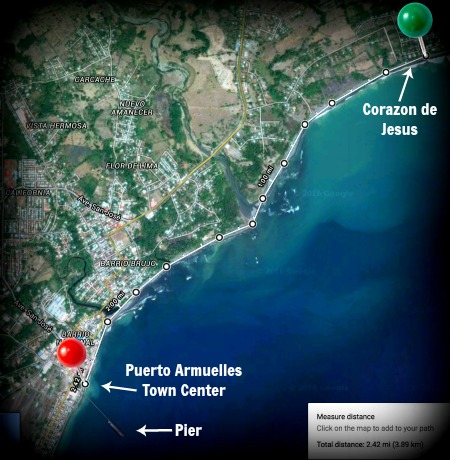
I had been thinking of doing it for awhile, but I finally shook off my laziness and did it. And I took my daughter along for the ride.
We are both happy we did it.
According to Google, it is 2.42 miles from the Corazon de Jesus neighborhood to downtown Puerto Armuelles.
I cannot tell you how long it took since we stopped so very often, but I'm thinking if you were a little more focused on your destination you could do it in about 40 minutes.
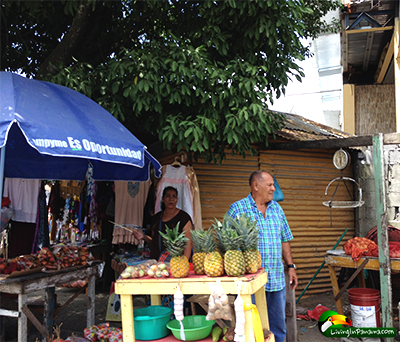
I am writing this in late March, the peak of the dry season, and the temperature can get pretty hot in these months (today there is a wonderful breeze blowing off the ocean, so it is not too hot). Since our house is not air conditioned, I sometimes find myself driving my wife’s air conditioned car to Romero’s supermarket (also air conditioned), possibly buying a local paper, and reading it at a leisurely pace, while I sip a Cappuccino (50 cents) in air conditioned bliss. When I am finished reading and sipping, I slowly wander through the aisles to choose my groceries in this comfortable, modern supermarket, before heading home to the family.
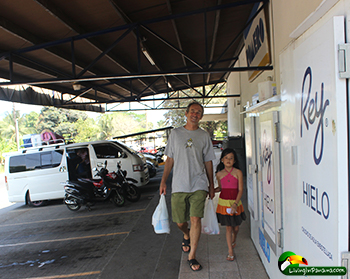
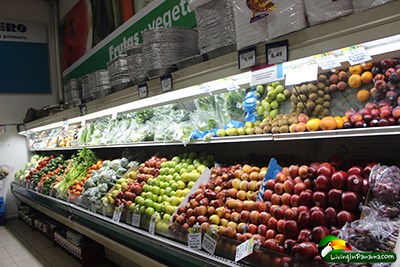
I know that I am paying more for groceries, particularly fresh produce at Romero’s than I would from one of the street vendors. Plus, the quality is not as good as it would be from the small street stalls, or pickup truck vendors who buy their produce directly from the farmers. They don’t take the produce to a central distribution center, as Romero’s does, before bringing it to Puerto Armuelles.
I have come to realize that, during the cooler, “rainy season” I go to Romero’s far less frequently. (FYI the rainy season is from mid-April to mid-December.) Most days in the rainy season, I ride my bike to run errands around town. Then, I avoid the modern supermarket. My family tends to eat more healthfully, and our grocery bills are much lower.
But this article is not about our Rainy Season-Dry Season climate here in Panama. It is about how you can save about 50% on your grocery bill, as well as eating a much healthier diet, if you buy your produce from the street vendor rather than going to Romeros or another
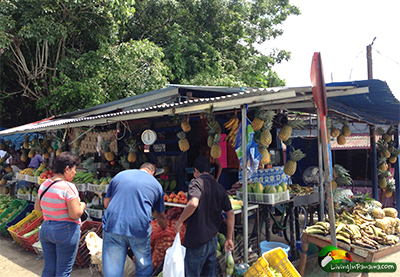
Supermaercado.
(If you do want to know about the weather in Panama, Betsy wrote about it here.)
The best days to shop are on dias los jubilados, which is when retired folks all over Panama line up to receive their semi-monthly social security check. On those days the number of vendors and the variety of items for sale skyrocket.
Find out about Chiriqui's Organic Farm, Finca Santa Marta. They deliver organic produce to you here in Puerto Armuelles and throughout Panama. The info is under Tip #2, Eat Healthfully & Locally.
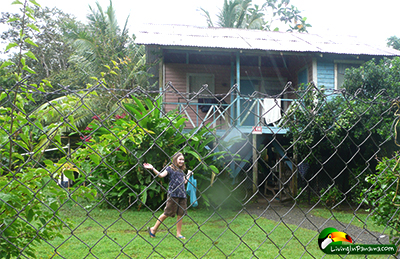
In addition to great value on super fresh produce, you can also save a bundle by purchasing fresh-caught fish from local fish buyers in Puerto.
There are several neighborhoods where a local wholesale fish buyer buys from the fishermen and will sell to you at very reasonable prices.
For example, you can always find fresh:
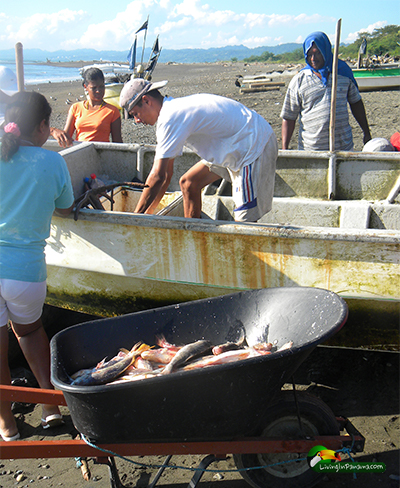
I suppose that you could try to buy directly from the fishing boat, but I have a feeling that this would not go over well with the fish buyer. Generally, all fish in the neighborhood fishing fleet are sold to one or two buyers. They get a consistent product, and they provide a consistent market for the fishermen.
Of course you also run into people trying to sell you seafood out of a bag - with no ice - I always say no to that.
Watch a video of buying fish fresh off the boat in Puerto Armuelles.
You can also buy both beef and pork from local ranchers, and save a bundle. You might have to buy an entire side, or quarter of a steer, or pig, but if you ask around, you can usually find some one to go in on the purchase. But to do that successfully, you will need to purchase a dedicated freezer to store your meat.
One neighbor of ours frequently raises a pig for his family’s own personal use. He has also built a smoker, so that he can custom smoke his own bacon, and he stuffs his own, custom smoked and seasoned pork sausage. Neighbors and friends who get on his “list” early can enjoy the same great quality pork products.
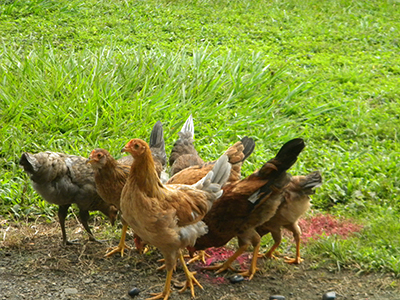
I was surprised to find that free range chickens (gallina de patio) tend to cost much more than commercially raised chickens. While a whole chicken at Romero’s, if you can find one, might cost $6 or $7, a family raised, free range bird might run as much as $13, o$14. Once I discovered just what effort it takes to raise a chicken, successfully, to adulthood, in and around one’s own yard, I understood.
As a side note, this short video below shows the challenges we had raising gallinas de patio. Of course, our daughter would never even think of us eating her chicken friends.
[leadplayer_vid id="5724C858929BD"]
The free range birds, are truly free range, and these will be the same birds that you have seen running around near the street (or in the street--- so drive carefully; “You killed it, you bought it”, as the saying goes.) When people have gallina de Patio to sell they will sometime announce that fact by posting a sign saying simply, Gallina de Patio. Ask around and you can find out who usually sells them.
Important Cooking Tip For Gallina de Patio
If you decide to buy one, you cannot cook it like you would a "regular"chicken. These birds are tough. Gallinas de Patio eats mostly bugs, and table scraps, and do not usually eat any commercial (read, hormone-fortified) feed. Thus they eat a lot more protein, very little grain, and no chemicals. They grow more slowly and get a lot more exercise than their caged counterparts. In short, these birds live a life that is a lot closer to that which a wild fowl might live. As a result, these chickens are leaner (stringier and tougher) and have a stronger, “gamier” flavor.
The first time our family tried one of these birds, we put it on the grill and basted it in barbeque sauce. We just assumed that a really “special” chicken should be cooked on the grill and enjoyed all by itself, so that the flavor could be experienced.
We were wrong.
It was like chewing on a moccasin. The free range gallina de patio is better slow cooked, in a stew pot, so that the meat has time to become tender, and so that all the rich flavor of the meat can infuse the entire stew. If you try this, you will quickly discover the superior flavor of the gallina de patio. It is a delicacy. This is what chicken used to taste like, before all the gallinas de patio were rounded up and packed 7 per cage in the mega “chicken farm”.
How to cook a Gallinas de Patio - for Sancocho, of course.
When you move to Panama, you find that you have a lot more free time on your hands. One satisfying way to spend part of your day is to shop for, and prepare the best quality food available. You will find that you can lose weight, improve your overall health, and save a bundle on your grocery bill at the same time by taking advantage of buying directly from small local producers and vendors.
Learn 4 essential tips for healthy living in Panama.
[leadplayer_vid id="5723DDF19745E"]
This property is in a great location.
It is only a 1 minute stroll from our favorite beach in Puerto Armuelles, Panama & a 10 minute drive from the town center.
It is a popular area in the Corazon de Jesus neighborhood. In fact, already half the lots on this block are owned by expats.
And it is a pretty large lot measuring 7233 sq. feet (672 sq. meters). So you could easily build a bigger house on it.
Watch the video and click the link below for more information
Click here for more info on this Panama property
If you have questions, we would be happy to answer them.
Just give us a call, shoot us an email, or leave a comment below.
Thanks for watching